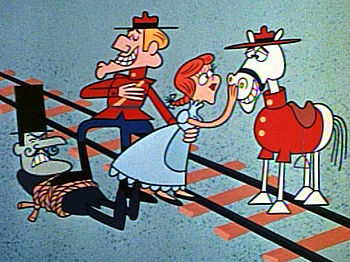I think it is pretty clear that grasshopper morality comes from grasshoppers. Even crickets, while they might occasionally be irritated at grasshoppers for their quiet, manipulative ways, agree in the end, "Well, they are grasshoppers. They don't operate by our rules." The same with dogs, sparrows, dinosaurs, and mosquitoes (although the latter's morality still encourages humans to kill them coldly, occasionally gleefully).
Thus, human morality comes from humans. While some might claim that God is the source of human morality, one would have to claim that God made humans to be a certain way. Sacred texts give some general direction, but none say, "Yes, give 20 dollars to the beggar on 20th and Main on Tuesday of next week because it will change his life." No, we figure out what to do, every day, with a holy book only giving us the most general of directions.
So where is the source of human morality? Where does it come from? This has been argued since the day of Plato's Republic, and is still being discussed today. The three main contenders are: a.Self interest; b. Moral reasoning and c. Emotion. Let's take a moment to look at each.
Self Interest
Glaucon in The Republic presented this case long before social Darwinists did. His argument is this: If a normal human being (not some goody-two-shoes Harry Potter) had an invisible cloak, he would get away with as much as he could. He would steal, have sex with whoever he wanted, find out secrets to cut down his enemies, etc. On the surface, if we have a fairly critical eye on human nature, we might agree. Micro economics is based on the idea that groups of people will always act in their own self interest. Studies have been done to show that if a person thought no one was looking, people-- almost all people-- would certainly cheat. However, those same studies show that people only cheat a little bit. The cheating might increase over time, if they were allowed, but most people aren't interested in stealing Ft. Knox, but only a little bit more than they have right now. Very few would become criminal masterminds. Yet this doesn't deny the power of self-interest in morality. But can we say that self-interest is the basis for all morality? Darwin speculated that morality is based on what is best for the group or species, not the individual, which accounts for traits of altruism. But does that really explain a person jumping into a river to save a drowning child, although he might himself die? Does it explain that we, as a species, are willing to let five people die as long as we don't kill one person?

Reason
The Enlightenment scholars said that the best kind of morality is reasoned morality, that which is considered and plotted. Plato agrees, which is why he felt that the Philosopher King is the one to rule. John Stuart Mill thought that morality could be measured like a mathematical formula, quantifying the right morality by measuring the total amount of pleasure by all people in any one action. Kant felt that reason can determine the correct action, by determining the most consistent good, without contradiction. But is reason actually the way we ever determine the right course of action? If so, why do all of the moral principles determined by strict reason seem to be missing something? Should we, like Kant says, never lie without exception? Certainly it is wrong to lie most of the time, but sometimes isn't it the right thing to do (like when my wife asks me how she looks before we go out)? Is the majority of pleasure really the best course of action, always? If an entire city could live in complete happiness for a year if a single, young child is tortured and killed, does that equation really equal morality? And in fact, studies have found that more often than not, reason is used after a moral course has been chosen. Do we reason to determine morality, or to make our actions seem more moral, no matter what we have chosen?

Emotion
Emotion isn't, strictly speaking, irrational. When we are angry, we sense injustice and we respond to that injustice. When we are fearful, we sense a danger to ourselves or our loved ones, and the emotion of "fear" drives us to respond to that. So emotions are less "irrational" and more of an innate, intuitive rationality. We are responding to a hidden reasoning that isn't necessarily conscious or even knowable. And it could be that our morality is based on that? How often is it that we know what is right or wrong instantly, without a moment's thought, even if we had never done a certain action before? And we do not always choose self interest as our motivating factor. People who make great sacrifices for others often do so instantly, without a thought for themselves, or really, thinking at all.

And yet, is morality strictly instinct? After all, people can be trained in certain moral thinking, even as a martial artist is skilled in precise movements. Certain Buddhists, Jews and Christians live a very peculiar mode of life, based on a certain morality given to them from their teachings. Is this a special kind of reasoning, or some divine guidance that allows them to live differently? Or is it their society that molds them and trains them to become so morally unique, until their moral decisions become just as quick as capitalists? And is society completely to be blamed or praised for the creation of saints or serial killers, neither of which is trained by any society at all? They seem to have their own set of moral codes that they follow, whether for ill or for good.
Or is it simply too complex to be determined?




















